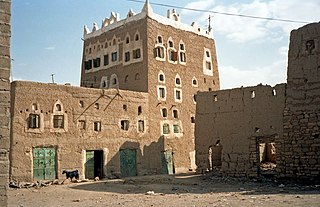Related Research Articles

The history of Yemen describes the cultures, events, and peoples of what is one of the oldest centers of civilization in the Near East. Its relatively fertile land and adequate rainfall in a moister climate helped sustain a stable population, a feature recognized by the ancient Greek geographer Ptolemy, who described Yemen as Eudaimon Arabia meaning "fortunate Arabia" or "Happy Arabia". Yemenis had developed the South Arabian alphabet by the 12th to 8th centuries BC, which explains why most historians date all of the ancient Yemeni kingdoms to that era.

Ali Abdullah Saleh al-Ahmar was a Yemeni politician who served as the first President of the Republic of Yemen, from Yemeni unification on 22 May 1990, to his resignation on 27 February 2012, following the Yemeni revolution. Previously, he had served as the fourth and last President of the Yemen Arab Republic, from July 1978 to 22 May 1990, after the assassination of President Ahmad al-Ghashmi. al-Ghashmi had earlier appointed Saleh as military governor in Taiz.

Yemen, officially the Republic of Yemen, is a country in West Asia. Located in southern Arabia, it borders Saudi Arabia to the north, Oman to the northeast, the Red Sea to the west, and the Indian Ocean to the south, sharing maritime borders with Eritrea, Djibouti and Somalia across the Horn of Africa. Covering roughly 528,000 square kilometres, with a coastline of approximately 2,000 kilometres, Yemen is the second largest country on the Arabian Peninsula. Sanaa is its constitutional capital and largest city. Yemen's estimated population is 34.7 million, mostly Arab Muslims. It is a member of the Arab League, the United Nations, the Non-Aligned Movement and the Organisation of Islamic Cooperation.
Sectarianism is a debated concept. Some scholars and journalists define it as pre-existing fixed communal categories in society, and use it to explain political, cultural, or religious conflicts between groups. Others conceive of sectarianism as a set of social practices where daily life is organized on the basis of communal norms and rules that individuals strategically use and transcend. This definition highlights the co-constitutive aspect of sectarianism and people's agency, as opposed to understanding sectarianism as being fixed and incompatible communal boundaries.

Zaydism is one of the three main branches of Shia Islam that emerged in the eighth century following Zayd ibn Ali‘s unsuccessful rebellion against the Umayyad Caliphate. Zaydism is typically considered to be a branch of Shia Islam that comes closest to the Sunni, although the "classical" form of Zaydism over the centuries had changed its posture with regard to Sunni and Shia traditions multiple times, to the point where interpretation of Zaydi as Shia is often based on just their acceptance of Ali as a rightful successor to prophet Muhammad. Mainstream ("twelver") Shia sometimes consider Zaydism to be a "fifth school" of Sunni Islam. Zaydis regard rationalism as more important than Quranic literalism and in the past were quite tolerant towards Sunni Shafi'ism, a religion of about half of the Yemenis.

Yahya Muhammad Hamid ed-Din was the first king of the Mutawakkilite Kingdom of Yemen from 1918 until his assassination in 1948. He became Imam of the Zaydis, a branch of Shia Islam, in 1904 after the death of his father, Muhammad Al-Mansur, and Imam of Yemen in 1918. His name and title in full was "His majesty Amir al-Mumenin al-Mutawakkil 'Ala Allah Rab ul-Alamin Imam Yahya bin al-Mansur Bi'llah Muhammad Hamidaddin, Imam and Commander of the Faithful".

Saada, a city and ancient capital in the northwest of Yemen, is the capital and largest city of the governorate of the same name, and the seat of the eponymous district. The city is located in the mountains of Serat (Sarawat) at an altitude of about 1,800 meters. In 2004, it was the tenth-largest city in Yemen and had an estimated population of 51,870.

The Hashid is a tribal confederation in Yemen. It is the second or third largest – after Bakil and, depending on sources, Madh'hij – yet generally recognized as the strongest and most influential. According to medieval Yemeni genealogies, Hashid and Bakil were the sons of Jashim bin Jubran bin Nawf Bin Tuba'a bin Zayd bin Amr bin Hamdan. Member tribes of the Hashid Confederation are found primarily in the mountains in the North and Northwest of the country.

The Houthi movement, officially known as Ansar Allah, is a Shia Islamist political and military organization that emerged from Yemen in the 1990s. It is predominantly made up of Zaidi Shias, with their namesake leadership being drawn largely from the Houthi tribe.

The Yemeni Congregation for Reform, frequently called al-Islah, is a Yemeni Sunni Islamist movement established in 1990 by Abdullah ibn Husayn al-Ahmar, Ali Mohsen al-Ahmar, Abdul Majeed al-Zindani, with Ali Saleh's blessing. The first article of Islah basic law defines it as "a popular political organization that seeks reform of all aspects of life on the basis of Islamic principles and teachings".

Abdul-Malik Badruldeen al-Houthi, also known as Abu Jibril, is a Yemeni politician and religious leader, who serves as the leader of the Houthi movement, a movement principally made up of Zaidi Muslims. His brothers, Yahia and Abdul-Karim are also leaders of the group, as were his late brothers Hussein, Ibrahim, and Abdulkhaliq. Abdul-Malik al-Houthi is the leading figure in the Yemeni Civil War which started with the Houthi takeover in Yemen in the Saada Governorate in northern Yemen.
The Axis of Resistance is an informal Iranian-led political and military coalition in the Middle East.

The Yemeni civil war is an ongoing multilateral civil war that began in late 2014 mainly between the Rashad al-Alimi-led Presidential Leadership Council and the Mahdi al-Mashat-led Supreme Political Council, along with their supporters and allies. Both claim to constitute the official government of Yemen.

Iran and Saudi Arabia are engaged in an ongoing struggle for influence in the Middle East and other regions of the Muslim world. The two countries have provided varying degrees of support to opposing sides in nearby conflicts, including the civil wars in Syria and Yemen; and disputes in Bahrain, Lebanon, Qatar, and Iraq. The struggle also extends to disputes or broader competition in other countries globally including in West, North and East Africa, South, Central, Southeast Asia, the Balkans, and the Caucasus.
The following is a timeline of the Yemeni civil war, which began in September 2014.

Shia Islam in Yemen is practiced by a substantial minority of the population, with the vast majority of Shia Muslims in Yemen being Zaydi, while a minority are Twelver and Isma'ili. Sunni Muslims make up 65% percent of Yemen, while 35% of the country are Shia Muslims. These Shia Muslims are predominantly concentrated in the northwestern regions of the country, including the capital and major cities that are some of the most densely populated areas of Yemen.
The 2022 Abu Dhabi attack was an attack against three oil tanker trucks and an under construction airport extension infrastructure in Abu Dhabi, United Arab Emirates conducted by the Houthi movement using drones and missiles. Although several missiles and drones were intercepted, 3 civilians were killed and 6 were injured by a drone attack.

The following outline is provided as an overview of and topical guide to the Wikipedia articles available about the Yemeni crisis, revolution, and Yemeni civil war (2014–present).
Issa Al-Laith also spelt Issa Allaith, Issa Al-Layth is a Yemeni vocalist and poet affiliated with the Houthi movement. Issa al-Laith is described as a popular zamil performer and poet for the Houthis, and is regularly featured on various Houthi media networks.
References
Bibliography
- Brandt, M. (2017). Tribes and Politics in Yemen: A History of the Houthi Conflict. Oxford University Press.
- Caton, S. C. (2005). Yemen Chronicle: An Anthropology of War and Mediation. Hill and Wang.
- Clark, V. (2010). Yemen: Dancing on the Heads of Snakes. Yale University Press.
- Dresch, P. (2001). A History of Modern Yemen. Cambridge University Press.
- Hamidaddin, Abdullah, ed. (2022). The Huthi Movement in Yemen: Ideology, Ambition and Security in the Arab Gulf. London: I.B.Tauris. ISBN 978-0-7556-4426-1.
- Hill, G. (2017). Yemen Endures: Civil War, Saudi Adventurism and the Future of Arabia. Oxford University Press.
- Lackner, H. (2019). Yemen in Crisis: Road to War. Verso.
- Orkaby, A. (2019). Beyond the Arab Cold War: The International History of the Yemen Civil War, 1962-68. Oxford University Press.
